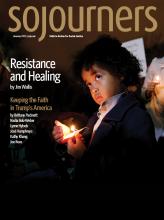IN THIS NEW LITURGICAL YEAR, the lectionary’s gospel readings are drawn from the book of Matthew, a story of the Messiah’s return. Matthew was a Jewish follower of Jesus living in the aftermath of the first Jewish revolt against Roman rule. The revolt, which lasted from 66 to 70 C.E., was not successful and ended with the Roman burning of Jerusalem and its temple, the very center of the Jewish world. One era of Jewish history ended, another opened up.
For some Jews, the destruction of the temple fueled their struggle against Rome, and they continued their hopeless revolt. For others—the successors of the Pharisees who led the early rabbinic movement—the fall of Jerusalem prompted them to craft a new Judaism based on the Book, instead of the temple. But Matthew’s gospel, the story of Jesus’ life and his collected teachings, offers a third option, based neither on revolt nor rabbinic tradition.
Roman reprisals after the uprising included the “Fiscus Judaicus”—a punitive tax levied on all Jews, male and female, free and slave, throughout the empire. The proceeds supported the Jupiter temple in Rome, dedicated to the deity that Rome considered responsible for the destruction of the Jerusalem temple. Humiliation was piled upon profound loss, inspiring virulent Jewish nationalism and rebellions around the Mediterranean basin. But all of the rebellions—led by Jews in Libya, Cyrene, Cyprus, and Egypt—were ruthlessly shut down by the Roman army. A final Jewish rebellion in Jerusalem gave the Emperor Hadrian an excuse to initiate a full-scale assault on Jerusalem and the villages of Judea. The results were decisive: The territory was depopulated and failed to recover.
Writing as a Jewish Christian, Matthew offered an alternative to this nationalist violence: the nonretaliatory teaching of Jesus. For instance, in his account of the temptations in the desert, Matthew concludes with Satan testing Jesus with a vision of the world’s kingdoms. “All these I shall give to you, if you will prostrate yourself and worship me” (Matthew 4:9). Here is a vision of empire, introduced into the imaginations of the time by the military success of Rome. But instead, Matthew shows Jesus, the Messiah-king, rejecting the option of empire, while linking that choice to another—servitude to Satan.
Read the Full Article

